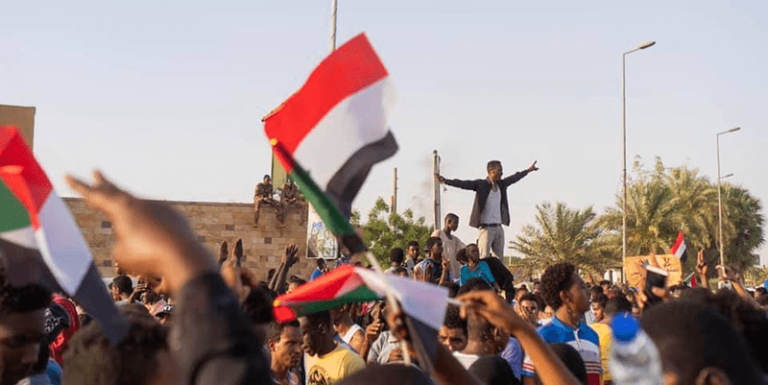
On July 17, 2019, Sudan’s Transitional Military Council (TMC) and the main opposition group, the Alliance for Freedom and Change (AFC), signed a power-sharing deal. It is hoped this will start a new phase in the country’s political life after months of protests. The agreement paves the way for a possible final accord to be reached between the parties regarding the constitutional document that will then set out, in detail, the terms for the transitional period from authoritarian rule.
The Agreement
The efforts of the African Union and Ethiopia have finally succeeded in breaking the deadlock between the TMC and AFC that started on June 3, when talks between the two parties collapsed after paramilitary forces violently broke up a sit-in protest outside the armed forces headquarters in Khartoum. The confrontation between the military and civilians caused the death of more than 100 peaceful protesters and wounded hundreds more. The recent accord reflects the agreement of the TMC and AFC on July 5, 2019—the so-called power-sharing deal—to establish a “sovereignty council” by rotation between military officers and civilians for a transitional period of three years and three months.
The latest accord signed in Khartoum sets in broad terms a series of transitional arrangements and appears to defer discussions on the final constitutional document until further negotiations are conducted.
The latest accord signed in Khartoum sets in broad terms a series of transitional arrangements and appears to defer discussions on the final constitutional document until further negotiations are conducted. The deal provides for a civilian-led government of technocrats and a sovereignty council that will operate as a collective presidency, with five members each from the TMC and the AFC. An eleventh member will be a civilian selected jointly by the two sides. The military will lead the proposed council for the first 21 months and then a civilian representative will take over for the remaining 18 months. The powers, functions, and responsibilities of the proposed sovereignty council are to be included in the final constitutional declaration.
The agreement also codified that the AFC will choose a civilian prime minister to form a civilian government of no more than 20 ministers; however, the ministries of defense and interior will be chosen by the military members of the sovereignty council. The jurisdiction of the government will be decided by the future constitutional document. Another provision established a legislative authority that will be formed after the formation of the sovereignty council and the government. The AFC will control 67 percent of this authority’s membership while the balance will be reserved for other forces in society that did not participate in signing the agreement. Finally, the agreement established a commission of inquiry to investigate the events of June 3 at the military headquarters in Khartoum.
Flaws in the Agreement
What the agreement has achieved may be seen as a victory for the protesters because the sovereignty council will be composed of a ruling body with a civilian majority. However, this author has learned that one of the difficult points has been that decisions of the council will be taken by consensus or by a two-thirds majority of the members when there is no consensus. Requiring agreement of two-thirds, rather than a simple majority, of the members of the sovereignty council to make decisions that are binding on the whole group is problematic. This defeats the purpose of having a civilian-majority ruling council, as civilians will always need at least one of the military members to concur before a decision can be made. It is also not clear how the members of the sovereign council will take decisions if they fail to agree on the 11th member. Failing to agree on the 11th member would complicate the decision-making process for civilians, mainly if the two-thirds majority mechanism is maintained.
Requiring agreement of two-thirds, rather than a simple majority, of the members of the sovereignty council to make decisions that are binding on the whole group is problematic.
It is not surprising that the agreement (and what will follow regarding any constitutional declaration made after further negotiations) is viewed and characterized as a power-sharing deal. The stance of the opposition drastically shifted from demanding the handover of power (from the TMC to civilians) to agreeing to a power-sharing deal with the military council. It is noteworthy that the TMC lacks both the moral and legal legitimacy to rule; at the same time, it will be able to block decisions in the sovereign council that do not serve its needs.
Nothing appears to suggest that the two-thirds mechanism for voting is a contested issue between the parties. The AFC—if its members agree to the two-thirds arrangement—should be aware that the decision-making mechanisms they have chosen and to which they have acceded will create a fragile (if not a futile) political transition that will eventually fail to live up to the expectations of the Sudanese people and meet the requirements of transition. For this reason, any constitutional document should lay out, to the extent possible, the terms of significant requirements that may be necessary for the transition as well as the mechanism for giving effect to such requirements. This could create the most pressing questions as civilians would face possible resistance from the military, such as what will be the mandate and scope of the proposed investigation commission? What measures will be agreed on to address transitional justice issues in Sudan?
The political agreement also provides that after the establishment of the transitional government, a national independent commission of inquiry will be formed to carry out a transparent and detailed investigation into the bloody and unfortunate incidents and crimes committed on June 3, 2019 in addition to other occurrences that were marked by violations of the rights and dignity of citizens, both civilian and military. The commission may request assistance from any African nations, if the need arises. The text of the agreement is very broad and implies that the constitutional document, which the parties are currently negotiating, is unlikely to include any detailed provisions regarding the jurisdictions, obligations, and powers of the commission. In addition, the commission will be formed only after the transitional government is established. This will take time, thus giving the TMC ample opportunities to try to erase all traces of its direct involvement in the crimes committed on June 3, 2019.
Another critical issue is how an independent and credible investigation into the June 3 killings will be launched to investigate the TMC if five of its members are likely to be ones who will be nominated by the military to form the sovereignty council with the civilians.
Another critical issue is how an independent and credible investigation into the June 3 killings will be launched to investigate the TMC if five of its members are likely to be ones who will be nominated by the military to form the sovereignty council with the civilians. These include Lieutenant General Abdel-Fattah al-Burhan, the chairman of the TMC, and his deputy, Commander of the Rapid Support Forces Lieutenant General Mohamed Hamdan Dagalo (a.k.a. “Hemedti”). Therefore, many anticipate that among the main points of disagreement between the AFC and the TMC will be the “absolute immunity” that the TMC seeks to provide its members throughout the three-year transitional period. It is important that any immunity—if given—should be procedural and tied to the functions of the respective TMC member; it should aim merely to facilitate the carrying out of his/her responsibilities during the transition period and not shield the member and/or provide immunity from prosecution for criminal offenses in the long term.
The mandate, responsibilities, and powers of the commission should be fully set out in the constitutional document. For it to carry out its functions efficiently, the commission must be wholly independent of the TMC, the sovereignty council (when the TMC is dissolved), or any other entity. In addition, the members of the commission should be acting in their personal capacity and should not represent any government, international organization, public official, or economic or political interest. The commission’s main mandate is to engage in fact finding; to that end, it should have access to all concerned government agencies, officials, and files and records. More importantly, it should have the freedom to meet with any person it deems appropriate. All of this has to be reflected and detailed in the constitutional document.
The deal is a step forward and sets out the terms for the transitional period, to which the parties agree, in principle, in the course of their negotiations. It provides evidence of serious intent, and as such, it has moral force—but it does not legally compel the parties to conclude the constitutional document on those terms, or even at all. So many issues have been left for further negotiations, and the devil is in the details. It remains unknown whether the agreement represents a rare opportunity for democracy and the beginning of the rule of law in Sudan. One thing is for sure: in Sudan, the people are calling loudly for freedom, peace, and justice. The hope is that the constitutional document delivers what every Sudanese has been chanting for.
Abdelkhalig Shaib is a Sudanese attorney and member of the American and New York Bar Associations. He
holds LLB, LLM (Khartoum University), and LLM (Harvard University) degrees. He was a visiting researcher at Harvard Law School in 2011-2012. He is a founding member of the Arab Association of Constitutional Law.

